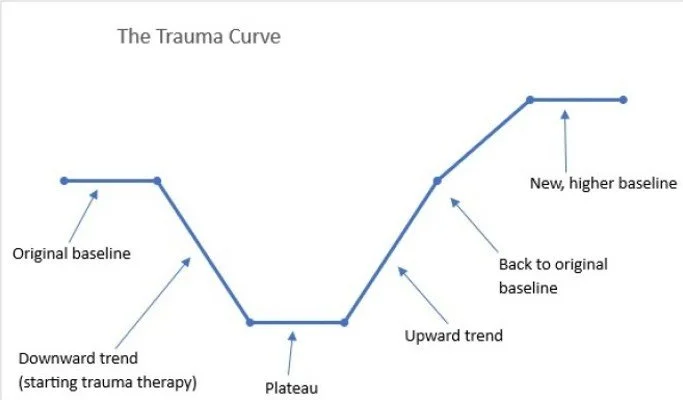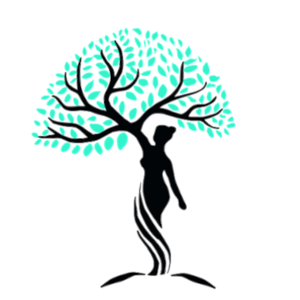Does Trauma Therapy Make You Feel Worse Before it Gets Better? Understanding the Trauma Curve
Why Do I Feel Worse After Therapy?
If you’ve ever left a therapy session feeling drained, overwhelmed, or even worse than when you walked in, you’re not alone. A common question people ask is:
“Does trauma therapy make you feel worse?” or “Does therapy make you feel worse?”
The short answer? It can—but that doesn’t mean it isn’t working. This is often a temporary worsening that is part of something called the trauma curve, and it is a completely normal part of the healing process and, if we push through this, individuals often end therapy feeling a lot better than when they started.
What is the Trauma Curve?
The trauma curve is a way to describe this emotional journey that many people experience when doing trauma therapy. Imagine an inverted bell curve like the image to your right.
You begin at your current baseline—often a place of anxiety, sleep issues, triggers, flashbacks, and other trauma responses
Once therapy begins, symptoms may feel more intense or raw. You may even think “Why do I feel worse after therapy?” or “Why is trauma therapy so hard?”
This dip is a normal reaction to processing long-buried memories, emotions, or beliefs
With continued work, you begin to move upward, healing and building a new, higher baseline—often with better sleep, fewer triggers, and a more regulated nervous system overall
Why is Trauma Therapy So Hard?
So, why is trauma therapy so hard? Simply, because it asks you to confront the very things you’ve worked so hard to avoid.
Many people spend years—even decades—pushing trauma into the background. Trauma therapy is like opening the door to a cluttered, overstuffed closet. Sometimes everything crashes out at once. Sometimes you rediscover memories or emotions you didn’t realize were even still there.
But, here’s the thing: This mess isn’t new—it’s just finally being seen.
Processing trauma can feel painful or destabilizing at first, but that’s part of reorganizing your inner world. It’s not making you worse, it’s allowing you to actually feel, process, and ultimately heal.
Does Trauma Therapy Make You Feel Worse? Yes—And Here’s Why That’s Okay.
Many people quit therapy during this low part in the trauma curve. They believe it isn’t working or that it is causing more harm than good. But, in reality, this is a sign that therapy is doing exactly what it’s meant to do—uncover and begin to heal unresolved wounds.
Here’s what to remember:
Feeling worse is temporary
You’re not broken or failing in anyway
You are processing and progressing, not regressing
A good trauma therapist will help you pace the process so it’s safe and manageable
What Types of Trauma Therapy Help Navigate the Curve?
While there are many effective trauma therapies out there, our clinic focuses on two primary, gentler, effective modalities:
EMDR (Eye Movement Desensitization and Reprocessing): an evidence-based modality that’s been around since the 1980s, and known as the gold standard of trauma therapy
Brainspotting: a modality that focuses on attunement and mindfulness and is typically gentle
These methods help you access and reprocess trauma without needing to fully rehash every detail verbally—making them more tolerable for many individuals than traditional talk therapy.
That said, the “best” therapy is the one that fits your needs, preferences, and nervous system. Healing is not one-size-fits-all.
You are not alone in this.
If you’re asking yourself:
“Why is trauma therapy so hard?”
“Why do I feel worse after therapy?”
“Does trauma therapy make you feel worse?”
“Does therapy make you feel worse?”
Please know these are normal and common reactions. They don’t mean you’re doing anything wrong—they actually mean you’re doing the deep, courageous work of healing.
Ready to begin your healing journey?
If you’re feeling stuck, overwhelmed, or afraid, we’re here to help. Contact our clinic for your complimentary consultation. Whether or not we are the right fit, we’ll help guide you to the support you need.
You deserve to heal. And yes, it really does get better.
Follow us on social media!
Soteria Mental Health
Specialized online trauma therapy specializing in EMDR, therapy for pregnancy and postpartum, anxiety therapy, and couples therapy. We support in:
Online therapy in Minnesota | Online therapy in Wisconsin
Online therapy in Vermont | Online therapy in California
Online therapy in Colorado | Online therapy in Delaware
Online therapy in Florida | Online therapy in South Carolina





